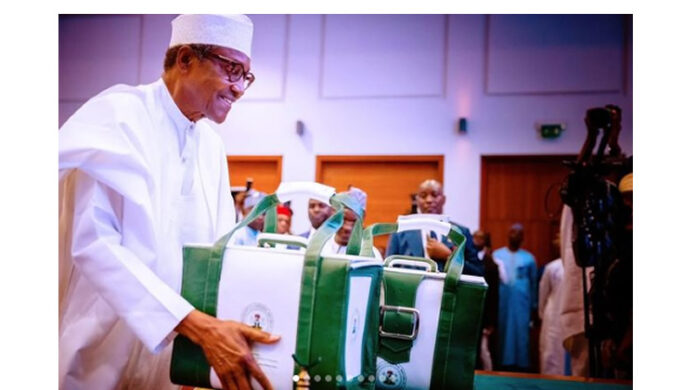• Its “foolish and criminal” to accumulate debt for your successor- Obasanjo
By Obinna Nwachukwu
With a proposal by the current administration to further borrow over N11 trillion to fund the 2023 budget deficit, President Muhammadu Buhari may bequeath a debt profile in excess of N55 trillion to the incoming government when he leaves office next May, the New National Star can authoritatively report.
The N20.5 trillion 2023 budget presented by Buhari to the National Assembly in October has a fiscal deficit of N10.78 trillion . With the theme ‘Budget of Fiscal Sustainability and Transition’, it is the eighth and final budget of the current administration.
The document was presented by Buhari before a joint sitting of the national assembly and was aimed at maintaining fiscal viability and ensuring a smooth transition to the next administration.
It is also designed to achieve the strategic objectives of the national development plan 2021 to 2025, including macro-economic stability; human development; food security; improved business environment; energy sufficiency; improving transport infrastructure, and promoting industrialisation focusing on small and medium-scale enterprises.
Data obtained from the Debt Management Office (DMO) shows that the Nigerian public debt profile rose by over N1 trillion in just three months of this year that is between June 30 to September 30, 2022. Following the development, Nigeria’s total debt stock rose to N44.06 trillion on September 30, as against N42.84 trillion recorded on June 30 this year, the DMO stated.
The debt “comprises the Total Domestic and External Debt Stock of the Federal Government of Nigeria (FGN), all State Governments and the Federal Capital Territory (FCT)”.
According to DMO, the increase in the public debt stock was largely due to new borrowings by the federal government to finance the deficit in the 2022 Appropriation Act, as well as new borrowings by state governments.
Former President Olusegun Obasanjo, under whose leadership Nigeria cleared its external debts, had criticized the Buhari’s regime for accumulating debt for future generations, describing it as a “foolish” and “criminal” act.
“What are we borrowing for? When I came in as an elected President we were spending $3.5 billion to service debt and even with that our quantum of debt was not going down,”
“If we are borrowing for recurrent expenditure it is height of folly. If you are borrowing for development that can pay itself, of course, that is understandable. Then paying itself, how long will it take to pay itself,”
“But if you are borrowing and you are accumulating debt for the next generation and the generation after them, it is criminal to put it mildly.” Obasanjo said in a video shared by Channels TV .
But Buhari’s media adviser Femi Adesina justified the huge borrowings, saying the regime is borrowing for infrastructural development unlike past governments who looted loans.
In the 2023 budget, the total fiscal operations of the federal government is expected to result in a deficit of N10.78 trillion.
The government intends to finance the deficit mainly by new borrowings totaling N8.80 trillion as well as N206.18 billion from privatisation proceeds and N1.77 trillion draw-downs on bilateral/multilateral loans secured for specific development projects/programmes.
The proposed borrowing represents 4.78 percent of the estimated GDP, above the 3 percent threshold set by the Fiscal Responsibility Act 2007.
In 2020 and 2021, government also exceeded the borrowing limit. Buhari explained that the government overshot its fiscal threshold due to the resources needed in the fight against insecurity.
“As envisaged by the law, we need to exceed this threshold considering the need to continue to tackle the existential security challenges facing the country,” he said.
Since the budget details were made public, there have been concerns about the impact it would have on the country’s rising deficits and debt, as well as its failure to address some of the structural deficiencies behind declining revenues and rising inflation.
Indeed, the 2023 budget expenditure of 20.51 trillion naira (US$43.7 billion) is the highest ever.
Analysts are worried that more than half of this is money government doesn’t have which would have to be financed with new debt. This will mean that the country exceeds the 3% of GDP threshold stipulated by the Fiscal Responsibility Act of 2007 – a pointer to the worsening of the country’s fiscal health.
Dr Muda Yusuf, former Director-General, Lagos Chamber of Commerce and Industry (LCCI) said more than 60% of the 2023 budget will finance debt repayments (N6.31 trillion), personnel costs (N4.99 trillion) and overheads (N1.11 trillion).
“This leaves very little for spending to revitalise the economy and raise its growth potential”, he explained.
“Rather than being a budget of hope, Buhari’s proposal is a budget of despair. It won’t significantly change the tempo of the economy. Nor will it reduce the country’s high unemployment, poverty and inflation rates”,.
“In fact it could worsen Nigeria’s cycle of deficits and debts, without the possibility of fostering structural transformation, diversifying the economy, promoting sustainable economic growth, and reducing unemployment and poverty”, he added.
Also speaking former commissioner for Finance, Imo state and Professor of Finance, Uche Uwaleke said he was not surprised at Buhari’s penchant for loans stressing that the 2023 budget is consistent with previous Buhari administration’s budget patterns.
He said the biggest problem is that the budget fails to address the issue of diversifying the economy.
“The 2023 budget prioritises investment in road and rail projects, power projects, clean water, construction of irrigation infrastructure and dams across the country, and critical health projects.
“These are all well and good, but it’s unclear how they will reduce the high unemployment and poverty rates in the country. These projects are not widespread and labour-intensive enough to absorb millions of unemployed Nigerians.
“Most importantly, it doesn’t address structural deficiencies in the Nigerian economy. These include the lack of diversification and non-oil sources of revenue. These have been responsible for the country’s cycle of high budget deficits and government debts” he said

